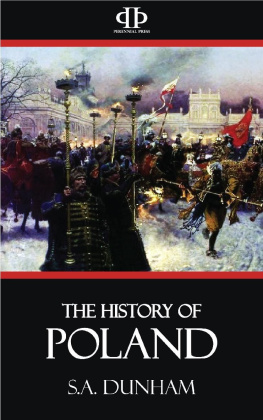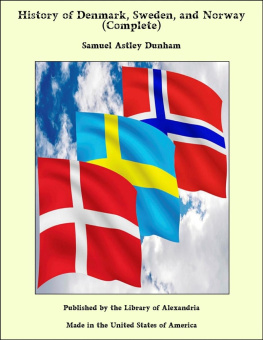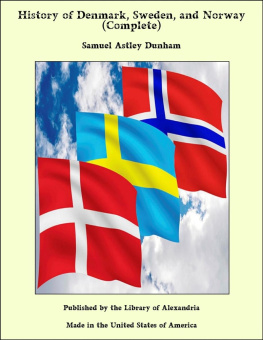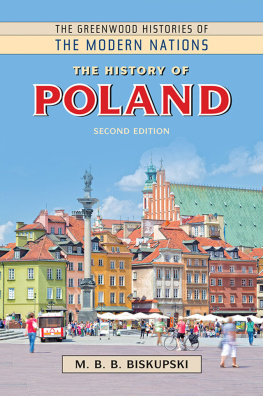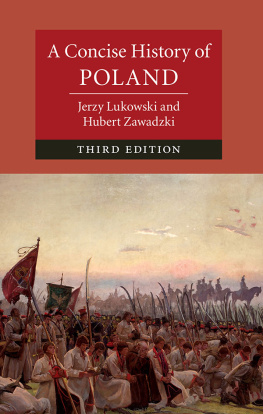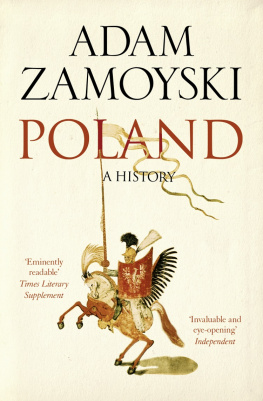S.A. Dunham - The History of Poland
Here you can read online S.A. Dunham - The History of Poland full text of the book (entire story) in english for free. Download pdf and epub, get meaning, cover and reviews about this ebook. publisher: Perennial Press, genre: Detective and thriller. Description of the work, (preface) as well as reviews are available. Best literature library LitArk.com created for fans of good reading and offers a wide selection of genres:
Romance novel
Science fiction
Adventure
Detective
Science
History
Home and family
Prose
Art
Politics
Computer
Non-fiction
Religion
Business
Children
Humor
Choose a favorite category and find really read worthwhile books. Enjoy immersion in the world of imagination, feel the emotions of the characters or learn something new for yourself, make an fascinating discovery.
- Book:The History of Poland
- Author:
- Publisher:Perennial Press
- Genre:
- Rating:5 / 5
- Favourites:Add to favourites
- Your mark:
- 100
- 1
- 2
- 3
- 4
- 5
The History of Poland: summary, description and annotation
We offer to read an annotation, description, summary or preface (depends on what the author of the book "The History of Poland" wrote himself). If you haven't found the necessary information about the book — write in the comments, we will try to find it.
The History of Poland — read online for free the complete book (whole text) full work
Below is the text of the book, divided by pages. System saving the place of the last page read, allows you to conveniently read the book "The History of Poland" online for free, without having to search again every time where you left off. Put a bookmark, and you can go to the page where you finished reading at any time.
Font size:
Interval:
Bookmark:

2015
AMIDST THE INCESSANT INFLUX OF the Asiatic nations into Europe, during the slow decline of the Roman empire, and the migrations occasioned by their arrival, we should vainly attempt to trace the descent of the Poles. Whether they are derived from the Sarmatians, who, though likewise of Asiatic origin, were located on both sides of the Vistula long before the irruptions of the kindred barbarians, or from some horde of the latter, or, a still more probable hypothesis, from an amalgamation of the natives and new comers, must for ever remain doubtful. All that we can know with certainty is, that they formed part of the great Slavonic family which stretched from the Baltic to the Adriatic, and from the Elbe to the mouth of the Borysthenes. As vainly should we endeavour, from historic testimony alone, to ascertain the origin of this generic term slave, and the universality of its application. Conjecture may tell us, that as some of the more powerful tribes adopted it to denote their success in arms (its signification is glorious), other tribes, conceiving that their bravery entitled them to the same enviable appellation, assumed it likewise. It might thus become the common denomination of the old and new inhabitants, of the victors and the vanquished; the more readily, as most of the tribes comprehended under it well knew that the same cradle had once contained them. Other people, indeed, as the Huns or the Avars, subsequently arrived from more remote regions of Asia, and in the places where they forcibly settled, introduced a considerable modification of customs and of language: hence the diversity in both among the Slavonic nationsa diversity which has induced some writers to deny the identity of their common origin. But as, in the silence of history, affinity of language will best explain the kindred of nations, and will best assist us to trace their migrations, no fact can be more indisputable than that most of the tribes included in the generic term slavi were derived from the same common source, however various the respective periods of their arrival, and whatever changes were in consequence produced by struggles with the nations, by intestine wars, and by the irruption of other hordes dissimilar in manners and in speech. Between the Pole and the Russian is this kindred relation striking; and though it is fainter among the Hungarians from their incorporation with the followers of Attila, and among the Bohemians, from their long intercourse with the Teutonic nations, it is yet easily discernible.
Of these Slavonic tribes, those which occupied the country bounded by Prussia and the Carpathian mountains, by the Bug and the Oder those especially who were located on both banks of the Vistula were the progenitors of the present Poles. The word Pole is not older than the tenth century, and seems to have been originally applied, not so much to the people as to the region they inhabited; polska in the Slavonic tongue signifying a level field or plain.
The Poles as a nation are not of ancient date. Prior to the ninth century they were split into a multitude of a rendered him worthy of the choice. CRACUS repressed the licentious, encouraged the peaceable, established tribunals for the administration of justice, and triumphed over all his enemies, domestic and foreign. He founded Cracow, whither he transferred the seat of his government.
LECH II.His son, Lech II., ascended the ducal throne by a fratricide: he assassinated his elder brother in a wood; but he had the address to conceal for a time his share in that dark deed. But divine justice slumbered not his crime was discovered, and he was deposed and banished by his indignant subjects. The tender affection, however, which they bore to the memory of Cracus induced them to elevate his daughter Wenda to the throne.
WENDA. [750.]This princess was of surprising beauty, of great talents, and of still greater ambition. Power she deemed too sweet to be divided with another, and she therefore resolutely refused all offers of marriage. Incensed at her haughtiness, or in the hope of accomplishing by force what persuasion had attempted in vain, Rudiger, one of her lovers, who was a German prince, adopted a novel mode of courtship. At the head of an army he invaded her dominions. She marched against him. When the two armies met, Rudiger again besought her to listen to his suit, and thereby spare the effusion of blood. The maiden was inexorable: she declared that no man should ever share her throne; that she would never become the slave of a husband, since, whoever he might be, he would assuredly love her person much less than her power. Her answer being spread among the officers of Rudiger, produced an effect which he little foresaw. Filled with admiration at the courage of the princess, whom they perceived hurrying from rank to rank in the act of stimulating her followers to the combat, and convinced that all opposition to her will would be worse than useless, they surrounded their chief, and asked him what advantage he hoped to gain from such an expedition. If thou shouldst defeat the princess, will she pardon thee the loss of her troops? If thou art subdued, will she be more disposed to love thee? The passion of Rudiger blinded him to the rational remonstrances of his followers: he persisted in his resolution of fighting; they refused to advance: in utter despair he laid hands on himself, and turned his dying looks towards the camp of the Poles. Wenda, we are told, showed no sign of sympathy at the tragical news, but returned triumphant to Cracow. Her own end was not less violent. Whether, as is asserted, to escape similar persecution, or, as is equally probable, from remorse at her own cruelty, having one day sacrificed to the gods, she threw herself into the waters of the Vistula and there perished.
With this princess expired the race of Cracus. Again, it is said, the fickle multitude divided the sovereign power, and subjected themselves to the yoke of twelve palatins. The two periods have evidently been confounded; either the power never existed, or an hypothesis, however, not very probable as this form of government was common to the Slavonic tribes, it may have been the only one admitted in Poland prior to the domination of the Piasts. Anarchy, we are told, was the immediate effect of this partition of power. The new chiefs were weak, indolent, and wicked; the tyrants of their subjects, and enemies of each other. In vain did the people groan; their groans were disregarded, and their efforts to shake, off the bondage they had imposed on themselves were rendered abortive by the power of their rulers, who always exhibited considerable energy when their privileges were threatened. The general wretchedness was increased by an invasion of the Hungarians, who had sprung from the same origin as the Poles, and who were inclined to profit by the dissensions between the chiefs and people. The palatins, whose duty it was to defend the country which they oppressed, were too conscious of their own weakness, and still more of their unpopularity, to risk an action with the enemy. Nothing but subjugation and ruin appeared to the dismayed natives, when both were averted by the genius of one man.
Fable.Though but a simple soldier, Prezemislas aspired to the glory of liberating his country. One dark night he adopted an expedient which had the merit of novelty at least to recommend it, and which has never since been imitated by any other general. With the branches and barks of trees he formed images of men with lances, swords, and bucklers: these he smeared with certain substances proper to reflect the rays of the sun, and render the illusion more striking. He placed these on a hill on the border of a forest directly opposite to the Hungarian camp. The stratagem succeeded: the following morning some troops of the enemy were despatched to dislodge the audacious few who appeared to confide in the excellence of their position. As the assailants approached the plain, the reflection ceased, and they were surprised to find nothing but fantastic forms of trees. The same appearance, however, of armed soldiers was discovered at a distance; and it was universally believed that the Poles had fallen back to occupy a more tenable post. The Hungarians pursued until, artfully drawn into an ambuscade, they were enveloped and massacred. How to ensure the destruction of the rest was now the object of Prezemislas: it was attained by another stratagem scarcely less extraordinary. He clothed some of his followers in the garb and armour of the slain Hungarians, and marched them boldly towards the enemys camp, while another body of Poles, by circuitous paths, hastened towards the same destination. Having thus reached the outposts, the former suddenly fell on the astonished Pannonians; while the latter, rushing forwards from another direction, added to the bloody horrors of the scene. In vain did the invaders attempt a combined defence: before they could be formed into any thing like systematic order they were cut off almost to a man, notwithstanding individual acts of bravery which called forth the admiration of the assail ants.
Font size:
Interval:
Bookmark:
Similar books «The History of Poland»
Look at similar books to The History of Poland. We have selected literature similar in name and meaning in the hope of providing readers with more options to find new, interesting, not yet read works.
Discussion, reviews of the book The History of Poland and just readers' own opinions. Leave your comments, write what you think about the work, its meaning or the main characters. Specify what exactly you liked and what you didn't like, and why you think so.

